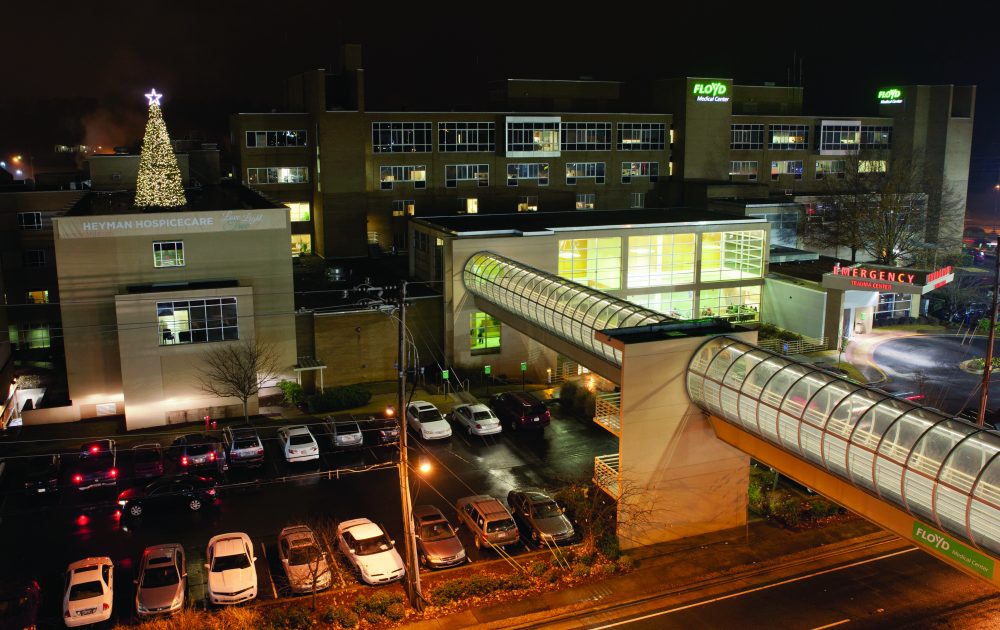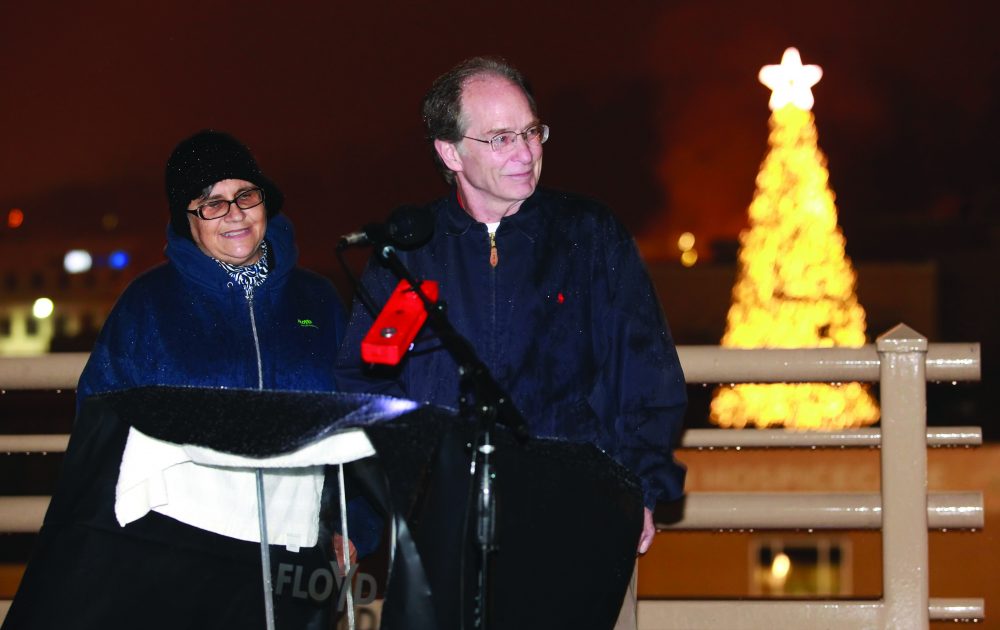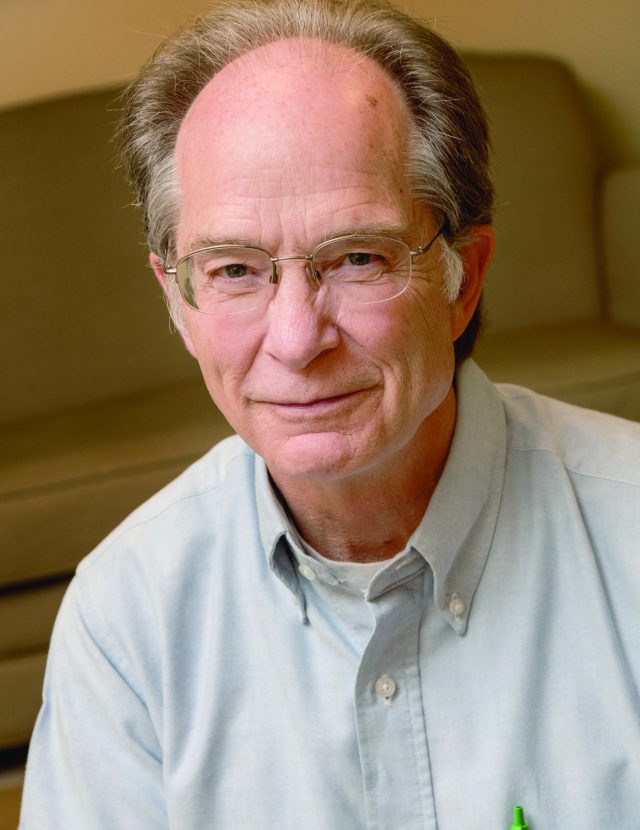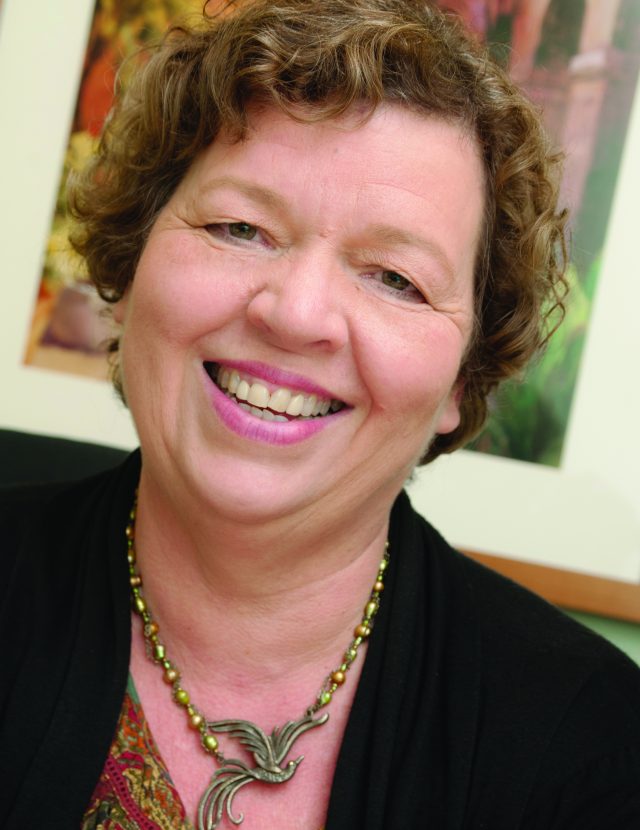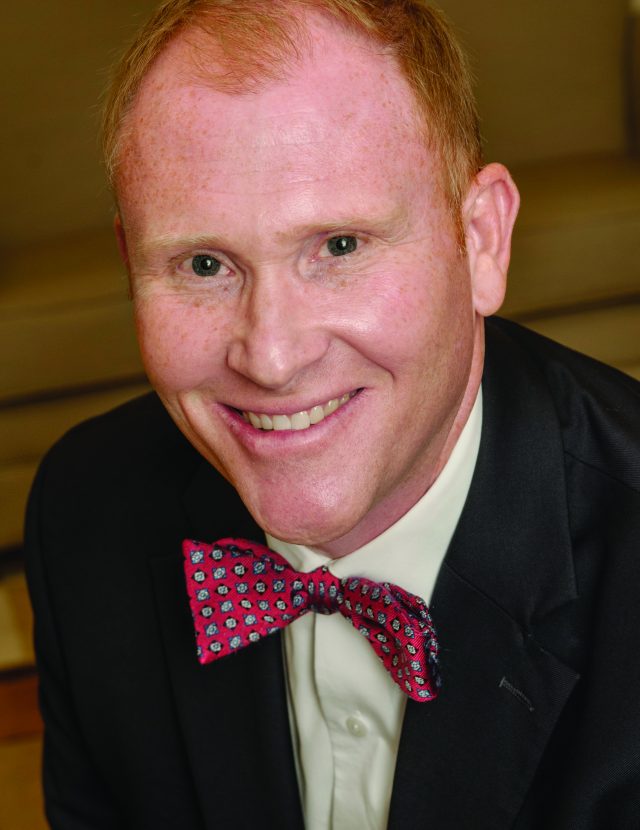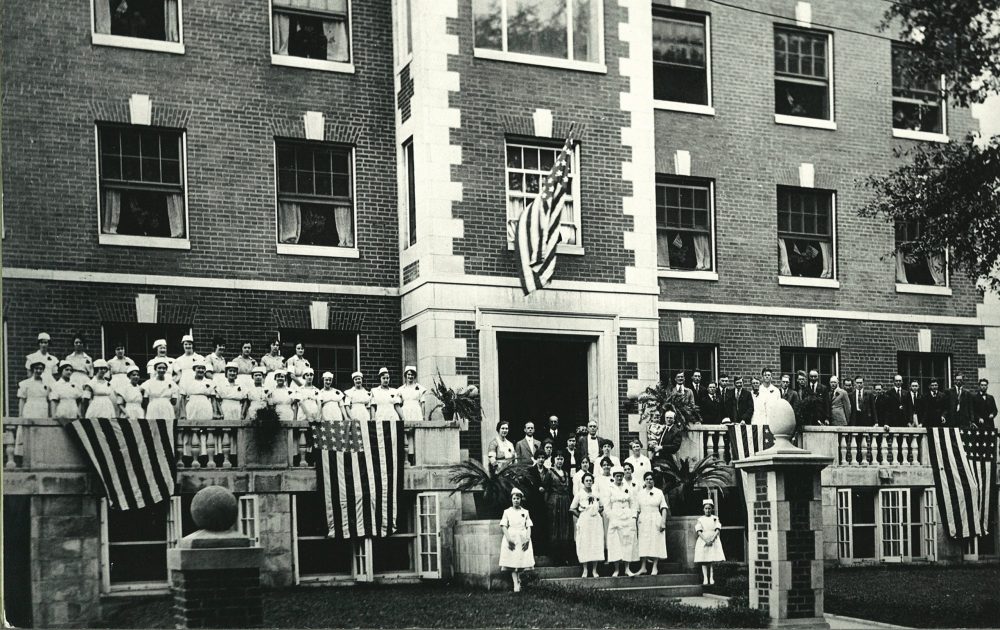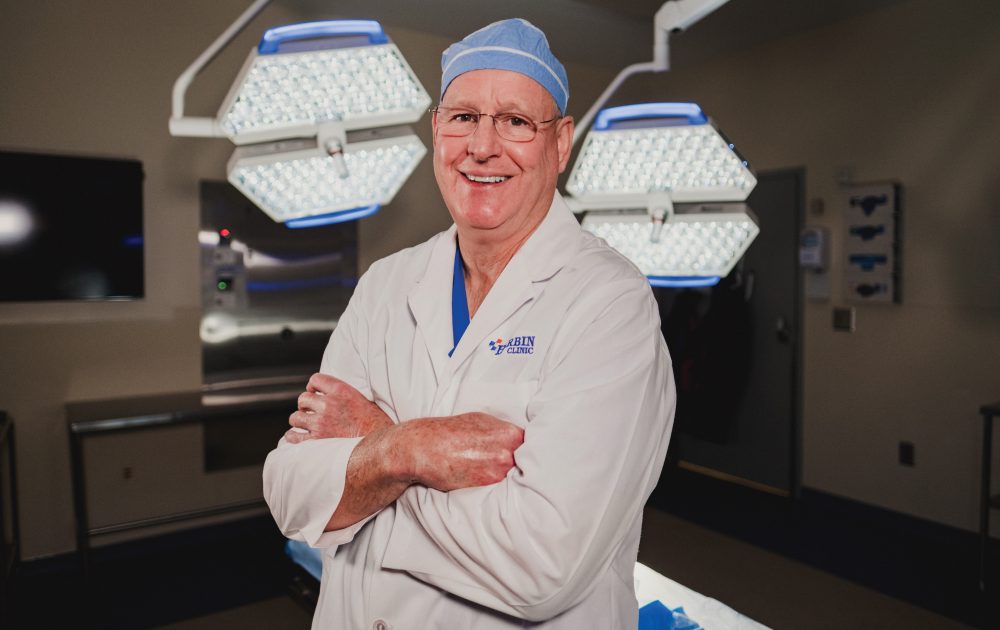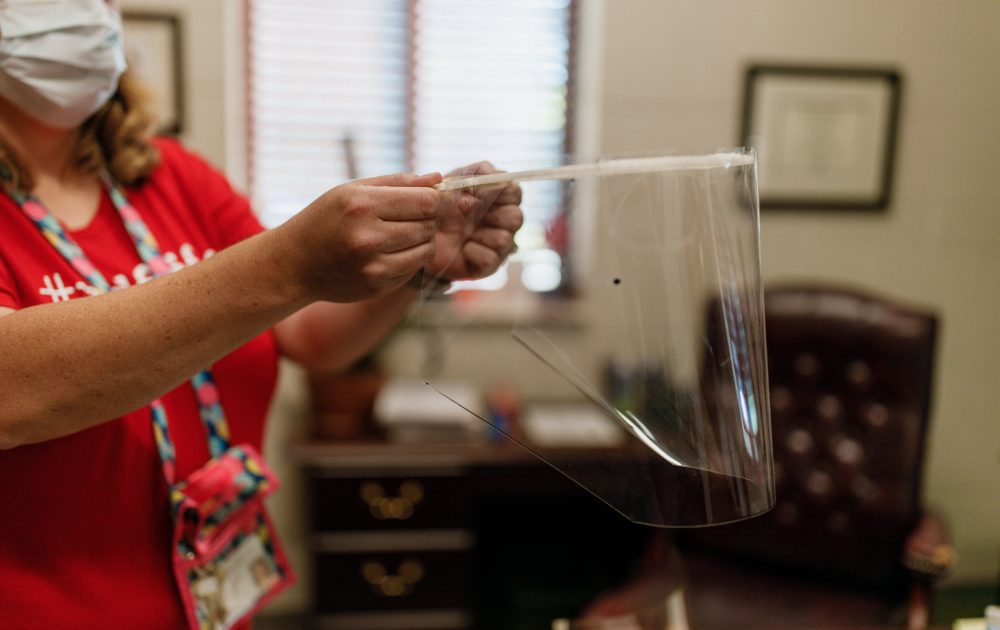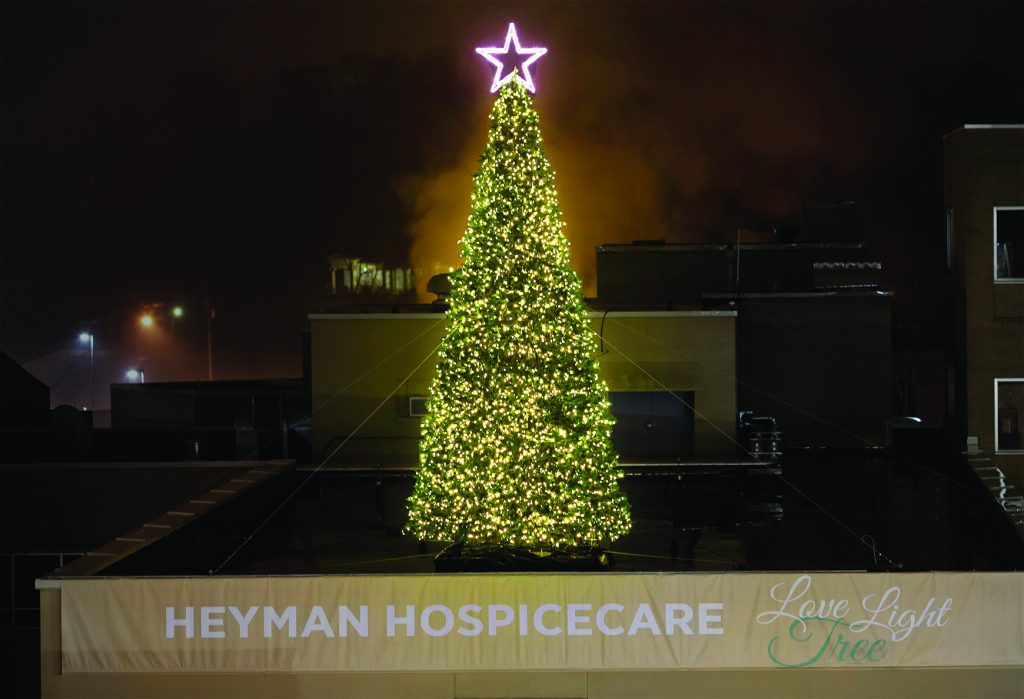
Photos by Derek Bell and Floyd Heyman Hospice Care
The holiday season is in full swing. From manger scenes to giant blow up Santas, we are reminded of it at every turn, zipping from here to there, on one errand or another. This time of year ñ and the decorations that come with it ñ evoke special feelings in all of us, remembering our past experiences and passing them on to the next generation.
We have all become accustomed to the decorative traditions of families in our neighborhoods or businesses in the community, and one such celebration of the season sits high atop the roof of Floyd Medical Center in the form of a Christmas tree, now sparkling with lights against the night sky.
This well-known holiday staple is known as the LoveLight Tree and with 8,415 lights shining brightly in remembrance of loved ones lost, or in honor of those who served them through Floyd Heyman HospiceCare. It’s a holiday landmark that stands as reflection of life, giving us all a little more than a reminder of the season.
Each year Floyd Heyman HospiceCare (FHHC) offers support to 500-600 families from all over the region, granting patients and caregivers relief after treatments are deemed helpless. For many who qualify for the transition to HospiceCare, the end of a long and grueling road draws near, where the medications make them feel worse than they already feel and hope has been given only to be taken away time and time again.
While the public perception of HospiceCare may be all doom and gloom, what FHHC offers is, indeed, in stark contrast.
“Our No. 1 goal is quality of life,” says Dr. Jerry McCormick, medical director. “So many patients who walk through our doors are living in fear – fear of pain and suffering, fear that their loved ones will abandon them and that if they are not taking treatment they won’t have a physician to take care of them. I get to assure them this is not going to happen.
“I’ve been doing this for 24 years and have had to face the facts with patients time and time again,” he continues. “They know their bodies, they know they are at a crossroads, and where most doctors are so afraid to give up on treatment, I see the relief in the patient’s eyes when I level with them. They are relieved someone finally gave it to them straight and they can focus on making the most of the time they have left.”
From that moment forward, the staff at FHHC shifts the medical strategy to treating the symptoms instead of the illness.
“From the patient’s perspective, they have to be somewhat emotionally and mentally ready to make that step,” says Joy Jones, director of Floyd Heyman HospiceCare. “Part of our job is helping them accept that they are at a point where treatment is doing more harm than good. We hear patients say they don’t want to go back to the hospital or that they are tired of being poked and prodded with no results. When they acknowledge that they don’t want to go through the rigors of treatment anymore, we can begin to focus on treating their symptoms and getting the most out of the time they have left.”
FHHC takes great pride in delivering the best care available to their patients and works to achieve this goal by choosing a dedicated, experienced staff to serve them. Not every medical professional is cut out for hospice work, so certain experiences and personality traits are paramount for prospective employees and volunteers.
Jones does a fine job in finding the right people for the job, as it isn’t often positions are vacant at FHHC.
“From our doctors to our volunteers, we are surrounded by people who have a calling to work in this environment,” says Jones. “I have never hired a nurse who wants to try out HospiceCare to see if they like it. They have to at least have taken care of people who are dying to know this is what they want to do. So, a passion for end-of-life care is certainly a prerequisite to work for us.”
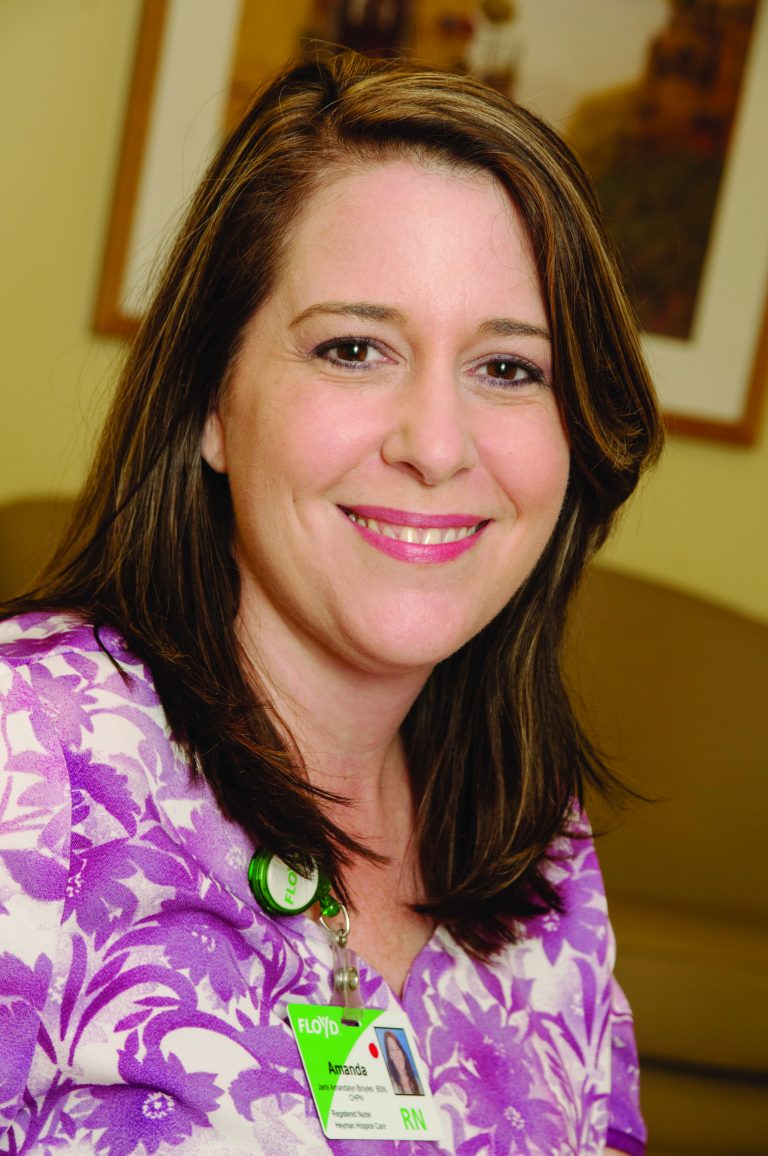
One employee who exemplifies that passion is Amanda Broyles, who was named 2014 Nurse of the Year by the National Board for Certification of Hospice and Palliative Nurses (NBCHPN).
She was driven toward HospiceCare after watching several members of her family leave this world supported by machines while lying in a hospital bed. The opportunity to help others remain at home with their families, helping to provide relief for their pain, was something she couldn’t pass up.
“I do believe it is a calling,” says Broyles, CHPN. “I have personal experience with loss that pushed me in this direction, so it’s something I’m very passionate about. To provide patients and their families with comfort and peace of mind in their final days is very rewarding work.”
Broyles was nominated for the award by her peers and administrators at FHHC, and out of 30,000 nominees, the (NBCHPN) chose her as the winner.
“To be completely honest, it was an award I accepted on behalf of everyone here at Floyd Heyman HospiceCare because we truly do function as one big team,” Broyles says, “and it’s because of our mentality that the care we provide to our patients is exceptional.”
This team mentality is built on support for patients, caregivers and among the staff members themselves. Each case is assigned a nurse and a social worker, as there are many things that must be attended to when facing the reality of death. Caregivers are often overwhelmed by what is going on with their loved ones, so the counsel FHHC provides to these caregivers is just as important as the care they provide to the patients.
It certainly helps to have someone with a background in social work who is also a thanatologist (a person who specializes in the study of the phenomena of death and of psychological mechanisms for coping with them) and Marsha Atkins is one of two such people on staff at FHHC.
“The study of death and dying is essentially the study of life and living,” Atkins says. “It is my job to help the families prepare themselves for the road ahead. Life goes on while our clients are dealing with all of these emotions, so we help them address personal and financial needs that might get neglected otherwise. I’m here to help them prepare for losing their loved one and to help them cope with grief and loss when they are gone.
“When someone dies, their pain may end, but the sense of loss the family feels can be overwhelming,” she adds. “Being able to help people through what can be one of the most dark and difficult [times] of their lives is a blessing. We form lifelong friendships with our clients because our staff invests themselves in to each and every one of our patients. So, we really are like one big family.”
The staff continues to support the patients loved ones long after they are gone via their bereavement program, which remains open to the caregivers for 18 months after the passing of their loved one.
This program helps family members and caregivers through issues ranging from coping with grief to re-entering social circles. FHHC also holds two memorial services honoring the patients they have lost each year, which allows the staff an opportunity to celebrate the lives of their patients with the caregivers they now call friends.
Another example of FHHC’s quality is the fact that it is the only hospice provider in Northwest Georgia qualified to work with children in HospiceCare. While these cases are rare, they do arise, and knowing FHHC is equipped to handle them certainly provides peace of mind to hospitals like Scottish Rite and Egleston, who refer them.
This trust stems from almost 25 years of service to the region and is something that could not have been achieved without the support of Floyd Medical Center.
“Having the support of Floyd behind our not-for-profit agency really allows us to be unique,” says Jones. “They enable us to do a lot for our patients while maintaining a small agency feel. People want to come [to] work here and that allows us to hire the best of the best.”
As for the belief that HospiceCare is centered on death and dying, Jones offers a different point of view.
“I don’t feel like I’m dealing with death, I feel like I’m dealing with life,” she says. “Every one of our patients is alive until the moment they die, and we get the honor and privilege of making the most out of that time while they are still here.”
So this Christmas when your eye is drawn to the twinkling lights on the tree atop Floyd Medical Center, take great pride in knowing that each bulb represents love for someone lost or the love shown by someone willing to ease their pain as they left this world.
“Last year was the first year we were able to have the tree on top of the hospital,” says Physician Liaison Art Lord. “Every time I rode by, it put a smile on my face. It’s more than a tree; it’s a reminder that we won’t be forgotten when we are gone. And for those under our care, it reminds them their loved ones will be taken care of when their time comes.”
For more info, call 706-509-3200 or visit the web at www.floyd.org/hospice

